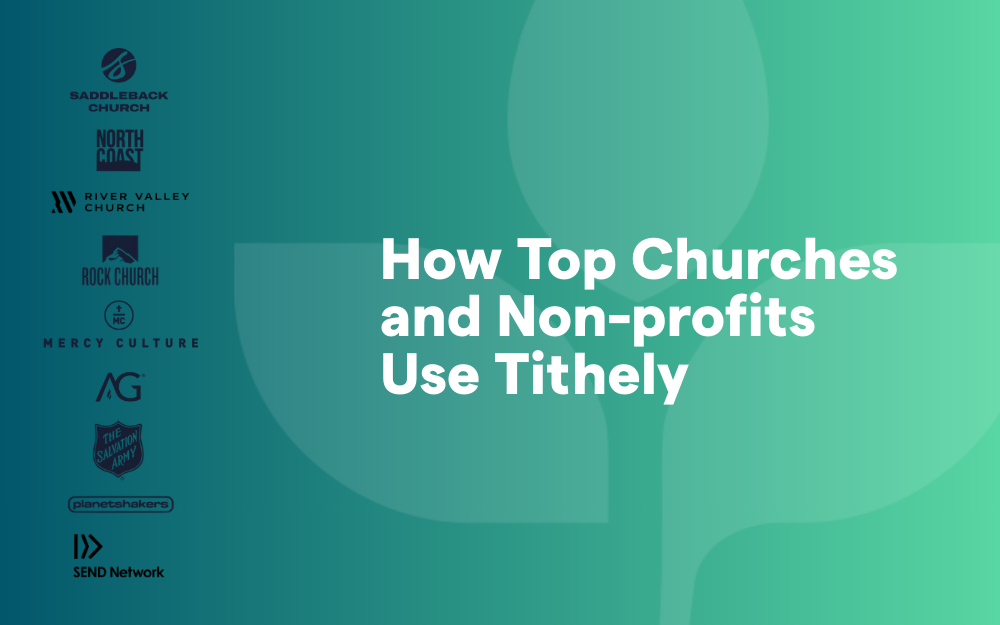5 Frequently Asked Questions About Tithing and Giving
Questions about Tithing? We've got answers to your frequently asked questions about tithing and giving.

Many church leaders find it uncomfortable to talk about money. But would knowing the questions people will ask ahead of time make you more comfortable? Even though we can’t read minds, we can provide you with the next best thing available: A list of questions people usually ask about tithing in the bible and what was the tithe for.
Knowing the typical questions people ask about hot topics and how you will respond is a huge benefit in conversations.
Consider this list of frequently asked questions about tithing and giving your study guide.
Five frequently asked questions about tithing and giving
- Why does the church talk about money so much?
- What is a tithe?
- Why should I give to my church?
- Can I trust the church with my money?
- Why do you accept credit or debit cards?
Let's get into it!
1. Why does the church talk about money so much?
From time to time, you may be asked why pastors often talk about money. This is a fair question, and the questionnaire probably doesn’t have a fight to pick. When responding to this question, here are two thoughts to keep in mind.
First, the reason the Church talks about money is because God talks about money. Jesus talked about money often! He devoted many of his parables to the topic of money, and he spoke about money more than he did about heaven and hell combined. In the end, roughly 25% of Jesus' words in the New Testament deal with biblical stewardship. And that’s not all.
There are more than 2,000 scriptures on tithing in the bible, money, and possessions in the Old and New Testaments. That's double the number of references to faith and prayer combined. The amount of time devoted to money and possessions in the Bible leads us to the next point.
Second, money is frequently discussed in the Bible because there’s a direct correlation between the way we handle our money and our faith. In the words of Jesus, “For where your treasure is, there your heart will be also” (Luke 12:34).
When it comes to money, we will either worship wealth or worship with our wealth.
Read that again. There’s a big difference between the two.
From the seduction of success to the lure of lust, many things in this world will vie for your affection and devotion. But the most significant idol we face is money (Matt. 6:24).
God desires our devotion, and he knows everyone will come face-to-face with the temptation of money, which is why he speaks so often about it.
Ok, on to the next frequently asked questions about tithing.
2. What is a tithe?
When asking this question about tithing, people are generally curious to know what you think about tithing, and whether they’re required to make one to your church. At first, fight the temptation to talk through the institution of what was the tithe in the Old Testament. The best thing to do is just to let people know that you’re talking about giving a tenth of your income.
3. Why should I give to my church?
Money can only stretch so far, and there are many worthy causes people can support. So why should they give to the Church?
Giving to a local church is less about giving per se and more about participating in the life of the church. You see, when you place your faith in Christ, you become a part of the body of Christ (1 Cor. 12). As a member of the body of Christ—the Church—God invites you to take part in his work, which includes giving to support the work of the Church.
When I talk about giving in this context, I'm not only talking about donating money. I also have in mind serving the church with your time and skills as well, which are equal parts of what biblical stewardship is all about.
In this response, I hope you see that giving to the Church is more about identity and participating in God’s work and less about obligation.
Related: Can I “Tithe” to Parachurch Organizations?
4. Can I trust the church with my money?
The answer to this question depends upon how your church handles its finances.
To help you think through your response, here are some things you may need to address:
How are church expenses approved?
Do you create an annual budget that’s approved ahead of time by your church’s leadership? What process does your church follow to approve expenses?
Regardless of your responses to the questions above, identify the checks and balances your church has in place to safeguard expenditures.
How does the church spend money?
The answer to this question will usually be the same between churches.
In general, your church budget probably falls within these parameters:
- Personnel: 33-45%
- Building/facilities: 25-30%
- Office expenses: <10%
For tips on responding to this question, consider the next question, first.
Related: 6 Must-Know Tips for Managing Your Church’s Finances
Can I review the church’s financial statements?
This can be a touchy question but consider, at a minimum, making your audited financial statements available upon request. Maintaining a high-level of transparency will boost confidence in the members of your church on how well you manage your finances.
The leadership of your church will be held accountable by God in the way you manage donations and gifts. Let this reality permeate through your church in the processes and procedures you create to steward your financial resources.
5. Why do you accept credit or debit cards?
As online giving and mobile giving continues to climb, many people in the Church feel reluctant about using a debit or credit card to donate. In general, credit and debit cards are a payment system. Instead of using coins, cash, or checks to donate, you can use a credit or debit card instead.
As for debit cards, they are attached to a bank account. So donations made with a debit card are pulled directly from someone's bank. There shouldn’t be too much of a concern about using a debit card to donate.
When it comes to using a credit card, the response is a little more nuanced.
On the one hand, some people choose to make purchases or donations on their credit card and pay off the entire balance at the end of the month. In this situation, there isn't a concern with using a credit card to donate. Yes, some people may be convicted otherwise, and that’s okay (Rom. 14:5-6). Regardless of where you fall on this particular example, strive to the honor the Lord as you sort through all the questions about tithing.
But, some people carry revolving debt they’ve racked up with their credit card. In this situation, it may not be best for someone to donate to your church with their credit card if they don't plan on paying off their balance. Accruing interest charges on debt you accumulate donating isn’t the best decision financially or spiritually.
Your turn
Giving is not about determining how much money we’re going to donate. Giving is about deciding how much money we’re going to use for our purposes. It all belongs to God, right?
Here are five common questions we hear about giving:
- Why does the church talk so often about money?
- What is a tithe?
- Why should I give to my church?
- Can I trust you with my money?
- Why do you accept credit or debit cards?
One last thing: If you're a church leader, check out this free resource for talking about tithes and offerings: Church Offering Talks: 52 Prompts for Every Occasion.
Looking for more bible study topics or bible verses on specific things?
- 100+ Encouraging Bible Verses & Religious Quotes
- 100 Bible Verses about Prayer and Praying
- 36 Bible Verses about Dads For Father’s Day
- Love You Forever, Mom | Bible Verses About Mothers and Mother's Day
- 100+ Thanksgiving Bible Verses That Will Make You Thankful
- 19 Critical Bible Verses on Greed: Explained, Applied, and Illustrated
- Bible Verses About Mothers for Mother’s Day
- Bible Verses About Debt to Proactively Grow
- 29 Inspirational Christmas Quotes & Christmas Bible Verses
- Bible Verses About Money & Possessions
- 100+ Thanksgiving Bible Verses That Will Make You Thankful
- Build Your Business on Faith: 55 Bible Verses About Business
- A Biblical Decision-Making Guide: 100 Bible Verses About Making Choices
- 30+ Bible Verses About Saving Money and Investing
- 67 Inspiring Bible Verses About Love and Marriage
- Tithing in the Bible: 100+ Scriptures about Giving and Generosity
- Bible Verses About Work & Working for God
- Bible Study Topics for Small Groups +Tips on Hosting a Church Small Group
- New Testament Books of the Bible: What You Need to Know
- “The Unforgivable Sin”: A Definitive Guide
- 26 Bible Verses About Technology
- 197 Inspirational Quotes & Bible Verses
Sign Up for Product Updates
Many church leaders find it uncomfortable to talk about money. But would knowing the questions people will ask ahead of time make you more comfortable? Even though we can’t read minds, we can provide you with the next best thing available: A list of questions people usually ask about tithing in the bible and what was the tithe for.
Knowing the typical questions people ask about hot topics and how you will respond is a huge benefit in conversations.
Consider this list of frequently asked questions about tithing and giving your study guide.
Five frequently asked questions about tithing and giving
- Why does the church talk about money so much?
- What is a tithe?
- Why should I give to my church?
- Can I trust the church with my money?
- Why do you accept credit or debit cards?
Let's get into it!
1. Why does the church talk about money so much?
From time to time, you may be asked why pastors often talk about money. This is a fair question, and the questionnaire probably doesn’t have a fight to pick. When responding to this question, here are two thoughts to keep in mind.
First, the reason the Church talks about money is because God talks about money. Jesus talked about money often! He devoted many of his parables to the topic of money, and he spoke about money more than he did about heaven and hell combined. In the end, roughly 25% of Jesus' words in the New Testament deal with biblical stewardship. And that’s not all.
There are more than 2,000 scriptures on tithing in the bible, money, and possessions in the Old and New Testaments. That's double the number of references to faith and prayer combined. The amount of time devoted to money and possessions in the Bible leads us to the next point.
Second, money is frequently discussed in the Bible because there’s a direct correlation between the way we handle our money and our faith. In the words of Jesus, “For where your treasure is, there your heart will be also” (Luke 12:34).
When it comes to money, we will either worship wealth or worship with our wealth.
Read that again. There’s a big difference between the two.
From the seduction of success to the lure of lust, many things in this world will vie for your affection and devotion. But the most significant idol we face is money (Matt. 6:24).
God desires our devotion, and he knows everyone will come face-to-face with the temptation of money, which is why he speaks so often about it.
Ok, on to the next frequently asked questions about tithing.
2. What is a tithe?
When asking this question about tithing, people are generally curious to know what you think about tithing, and whether they’re required to make one to your church. At first, fight the temptation to talk through the institution of what was the tithe in the Old Testament. The best thing to do is just to let people know that you’re talking about giving a tenth of your income.
3. Why should I give to my church?
Money can only stretch so far, and there are many worthy causes people can support. So why should they give to the Church?
Giving to a local church is less about giving per se and more about participating in the life of the church. You see, when you place your faith in Christ, you become a part of the body of Christ (1 Cor. 12). As a member of the body of Christ—the Church—God invites you to take part in his work, which includes giving to support the work of the Church.
When I talk about giving in this context, I'm not only talking about donating money. I also have in mind serving the church with your time and skills as well, which are equal parts of what biblical stewardship is all about.
In this response, I hope you see that giving to the Church is more about identity and participating in God’s work and less about obligation.
Related: Can I “Tithe” to Parachurch Organizations?
4. Can I trust the church with my money?
The answer to this question depends upon how your church handles its finances.
To help you think through your response, here are some things you may need to address:
How are church expenses approved?
Do you create an annual budget that’s approved ahead of time by your church’s leadership? What process does your church follow to approve expenses?
Regardless of your responses to the questions above, identify the checks and balances your church has in place to safeguard expenditures.
How does the church spend money?
The answer to this question will usually be the same between churches.
In general, your church budget probably falls within these parameters:
- Personnel: 33-45%
- Building/facilities: 25-30%
- Office expenses: <10%
For tips on responding to this question, consider the next question, first.
Related: 6 Must-Know Tips for Managing Your Church’s Finances
Can I review the church’s financial statements?
This can be a touchy question but consider, at a minimum, making your audited financial statements available upon request. Maintaining a high-level of transparency will boost confidence in the members of your church on how well you manage your finances.
The leadership of your church will be held accountable by God in the way you manage donations and gifts. Let this reality permeate through your church in the processes and procedures you create to steward your financial resources.
5. Why do you accept credit or debit cards?
As online giving and mobile giving continues to climb, many people in the Church feel reluctant about using a debit or credit card to donate. In general, credit and debit cards are a payment system. Instead of using coins, cash, or checks to donate, you can use a credit or debit card instead.
As for debit cards, they are attached to a bank account. So donations made with a debit card are pulled directly from someone's bank. There shouldn’t be too much of a concern about using a debit card to donate.
When it comes to using a credit card, the response is a little more nuanced.
On the one hand, some people choose to make purchases or donations on their credit card and pay off the entire balance at the end of the month. In this situation, there isn't a concern with using a credit card to donate. Yes, some people may be convicted otherwise, and that’s okay (Rom. 14:5-6). Regardless of where you fall on this particular example, strive to the honor the Lord as you sort through all the questions about tithing.
But, some people carry revolving debt they’ve racked up with their credit card. In this situation, it may not be best for someone to donate to your church with their credit card if they don't plan on paying off their balance. Accruing interest charges on debt you accumulate donating isn’t the best decision financially or spiritually.
Your turn
Giving is not about determining how much money we’re going to donate. Giving is about deciding how much money we’re going to use for our purposes. It all belongs to God, right?
Here are five common questions we hear about giving:
- Why does the church talk so often about money?
- What is a tithe?
- Why should I give to my church?
- Can I trust you with my money?
- Why do you accept credit or debit cards?
One last thing: If you're a church leader, check out this free resource for talking about tithes and offerings: Church Offering Talks: 52 Prompts for Every Occasion.
Looking for more bible study topics or bible verses on specific things?
- 100+ Encouraging Bible Verses & Religious Quotes
- 100 Bible Verses about Prayer and Praying
- 36 Bible Verses about Dads For Father’s Day
- Love You Forever, Mom | Bible Verses About Mothers and Mother's Day
- 100+ Thanksgiving Bible Verses That Will Make You Thankful
- 19 Critical Bible Verses on Greed: Explained, Applied, and Illustrated
- Bible Verses About Mothers for Mother’s Day
- Bible Verses About Debt to Proactively Grow
- 29 Inspirational Christmas Quotes & Christmas Bible Verses
- Bible Verses About Money & Possessions
- 100+ Thanksgiving Bible Verses That Will Make You Thankful
- Build Your Business on Faith: 55 Bible Verses About Business
- A Biblical Decision-Making Guide: 100 Bible Verses About Making Choices
- 30+ Bible Verses About Saving Money and Investing
- 67 Inspiring Bible Verses About Love and Marriage
- Tithing in the Bible: 100+ Scriptures about Giving and Generosity
- Bible Verses About Work & Working for God
- Bible Study Topics for Small Groups +Tips on Hosting a Church Small Group
- New Testament Books of the Bible: What You Need to Know
- “The Unforgivable Sin”: A Definitive Guide
- 26 Bible Verses About Technology
- 197 Inspirational Quotes & Bible Verses
podcast transcript
Many church leaders find it uncomfortable to talk about money. But would knowing the questions people will ask ahead of time make you more comfortable? Even though we can’t read minds, we can provide you with the next best thing available: A list of questions people usually ask about tithing in the bible and what was the tithe for.
Knowing the typical questions people ask about hot topics and how you will respond is a huge benefit in conversations.
Consider this list of frequently asked questions about tithing and giving your study guide.
Five frequently asked questions about tithing and giving
- Why does the church talk about money so much?
- What is a tithe?
- Why should I give to my church?
- Can I trust the church with my money?
- Why do you accept credit or debit cards?
Let's get into it!
1. Why does the church talk about money so much?
From time to time, you may be asked why pastors often talk about money. This is a fair question, and the questionnaire probably doesn’t have a fight to pick. When responding to this question, here are two thoughts to keep in mind.
First, the reason the Church talks about money is because God talks about money. Jesus talked about money often! He devoted many of his parables to the topic of money, and he spoke about money more than he did about heaven and hell combined. In the end, roughly 25% of Jesus' words in the New Testament deal with biblical stewardship. And that’s not all.
There are more than 2,000 scriptures on tithing in the bible, money, and possessions in the Old and New Testaments. That's double the number of references to faith and prayer combined. The amount of time devoted to money and possessions in the Bible leads us to the next point.
Second, money is frequently discussed in the Bible because there’s a direct correlation between the way we handle our money and our faith. In the words of Jesus, “For where your treasure is, there your heart will be also” (Luke 12:34).
When it comes to money, we will either worship wealth or worship with our wealth.
Read that again. There’s a big difference between the two.
From the seduction of success to the lure of lust, many things in this world will vie for your affection and devotion. But the most significant idol we face is money (Matt. 6:24).
God desires our devotion, and he knows everyone will come face-to-face with the temptation of money, which is why he speaks so often about it.
Ok, on to the next frequently asked questions about tithing.
2. What is a tithe?
When asking this question about tithing, people are generally curious to know what you think about tithing, and whether they’re required to make one to your church. At first, fight the temptation to talk through the institution of what was the tithe in the Old Testament. The best thing to do is just to let people know that you’re talking about giving a tenth of your income.
3. Why should I give to my church?
Money can only stretch so far, and there are many worthy causes people can support. So why should they give to the Church?
Giving to a local church is less about giving per se and more about participating in the life of the church. You see, when you place your faith in Christ, you become a part of the body of Christ (1 Cor. 12). As a member of the body of Christ—the Church—God invites you to take part in his work, which includes giving to support the work of the Church.
When I talk about giving in this context, I'm not only talking about donating money. I also have in mind serving the church with your time and skills as well, which are equal parts of what biblical stewardship is all about.
In this response, I hope you see that giving to the Church is more about identity and participating in God’s work and less about obligation.
Related: Can I “Tithe” to Parachurch Organizations?
4. Can I trust the church with my money?
The answer to this question depends upon how your church handles its finances.
To help you think through your response, here are some things you may need to address:
How are church expenses approved?
Do you create an annual budget that’s approved ahead of time by your church’s leadership? What process does your church follow to approve expenses?
Regardless of your responses to the questions above, identify the checks and balances your church has in place to safeguard expenditures.
How does the church spend money?
The answer to this question will usually be the same between churches.
In general, your church budget probably falls within these parameters:
- Personnel: 33-45%
- Building/facilities: 25-30%
- Office expenses: <10%
For tips on responding to this question, consider the next question, first.
Related: 6 Must-Know Tips for Managing Your Church’s Finances
Can I review the church’s financial statements?
This can be a touchy question but consider, at a minimum, making your audited financial statements available upon request. Maintaining a high-level of transparency will boost confidence in the members of your church on how well you manage your finances.
The leadership of your church will be held accountable by God in the way you manage donations and gifts. Let this reality permeate through your church in the processes and procedures you create to steward your financial resources.
5. Why do you accept credit or debit cards?
As online giving and mobile giving continues to climb, many people in the Church feel reluctant about using a debit or credit card to donate. In general, credit and debit cards are a payment system. Instead of using coins, cash, or checks to donate, you can use a credit or debit card instead.
As for debit cards, they are attached to a bank account. So donations made with a debit card are pulled directly from someone's bank. There shouldn’t be too much of a concern about using a debit card to donate.
When it comes to using a credit card, the response is a little more nuanced.
On the one hand, some people choose to make purchases or donations on their credit card and pay off the entire balance at the end of the month. In this situation, there isn't a concern with using a credit card to donate. Yes, some people may be convicted otherwise, and that’s okay (Rom. 14:5-6). Regardless of where you fall on this particular example, strive to the honor the Lord as you sort through all the questions about tithing.
But, some people carry revolving debt they’ve racked up with their credit card. In this situation, it may not be best for someone to donate to your church with their credit card if they don't plan on paying off their balance. Accruing interest charges on debt you accumulate donating isn’t the best decision financially or spiritually.
Your turn
Giving is not about determining how much money we’re going to donate. Giving is about deciding how much money we’re going to use for our purposes. It all belongs to God, right?
Here are five common questions we hear about giving:
- Why does the church talk so often about money?
- What is a tithe?
- Why should I give to my church?
- Can I trust you with my money?
- Why do you accept credit or debit cards?
One last thing: If you're a church leader, check out this free resource for talking about tithes and offerings: Church Offering Talks: 52 Prompts for Every Occasion.
Looking for more bible study topics or bible verses on specific things?
- 100+ Encouraging Bible Verses & Religious Quotes
- 100 Bible Verses about Prayer and Praying
- 36 Bible Verses about Dads For Father’s Day
- Love You Forever, Mom | Bible Verses About Mothers and Mother's Day
- 100+ Thanksgiving Bible Verses That Will Make You Thankful
- 19 Critical Bible Verses on Greed: Explained, Applied, and Illustrated
- Bible Verses About Mothers for Mother’s Day
- Bible Verses About Debt to Proactively Grow
- 29 Inspirational Christmas Quotes & Christmas Bible Verses
- Bible Verses About Money & Possessions
- 100+ Thanksgiving Bible Verses That Will Make You Thankful
- Build Your Business on Faith: 55 Bible Verses About Business
- A Biblical Decision-Making Guide: 100 Bible Verses About Making Choices
- 30+ Bible Verses About Saving Money and Investing
- 67 Inspiring Bible Verses About Love and Marriage
- Tithing in the Bible: 100+ Scriptures about Giving and Generosity
- Bible Verses About Work & Working for God
- Bible Study Topics for Small Groups +Tips on Hosting a Church Small Group
- New Testament Books of the Bible: What You Need to Know
- “The Unforgivable Sin”: A Definitive Guide
- 26 Bible Verses About Technology
- 197 Inspirational Quotes & Bible Verses
VIDEO transcript
Many church leaders find it uncomfortable to talk about money. But would knowing the questions people will ask ahead of time make you more comfortable? Even though we can’t read minds, we can provide you with the next best thing available: A list of questions people usually ask about tithing in the bible and what was the tithe for.
Knowing the typical questions people ask about hot topics and how you will respond is a huge benefit in conversations.
Consider this list of frequently asked questions about tithing and giving your study guide.
Five frequently asked questions about tithing and giving
- Why does the church talk about money so much?
- What is a tithe?
- Why should I give to my church?
- Can I trust the church with my money?
- Why do you accept credit or debit cards?
Let's get into it!
1. Why does the church talk about money so much?
From time to time, you may be asked why pastors often talk about money. This is a fair question, and the questionnaire probably doesn’t have a fight to pick. When responding to this question, here are two thoughts to keep in mind.
First, the reason the Church talks about money is because God talks about money. Jesus talked about money often! He devoted many of his parables to the topic of money, and he spoke about money more than he did about heaven and hell combined. In the end, roughly 25% of Jesus' words in the New Testament deal with biblical stewardship. And that’s not all.
There are more than 2,000 scriptures on tithing in the bible, money, and possessions in the Old and New Testaments. That's double the number of references to faith and prayer combined. The amount of time devoted to money and possessions in the Bible leads us to the next point.
Second, money is frequently discussed in the Bible because there’s a direct correlation between the way we handle our money and our faith. In the words of Jesus, “For where your treasure is, there your heart will be also” (Luke 12:34).
When it comes to money, we will either worship wealth or worship with our wealth.
Read that again. There’s a big difference between the two.
From the seduction of success to the lure of lust, many things in this world will vie for your affection and devotion. But the most significant idol we face is money (Matt. 6:24).
God desires our devotion, and he knows everyone will come face-to-face with the temptation of money, which is why he speaks so often about it.
Ok, on to the next frequently asked questions about tithing.
2. What is a tithe?
When asking this question about tithing, people are generally curious to know what you think about tithing, and whether they’re required to make one to your church. At first, fight the temptation to talk through the institution of what was the tithe in the Old Testament. The best thing to do is just to let people know that you’re talking about giving a tenth of your income.
3. Why should I give to my church?
Money can only stretch so far, and there are many worthy causes people can support. So why should they give to the Church?
Giving to a local church is less about giving per se and more about participating in the life of the church. You see, when you place your faith in Christ, you become a part of the body of Christ (1 Cor. 12). As a member of the body of Christ—the Church—God invites you to take part in his work, which includes giving to support the work of the Church.
When I talk about giving in this context, I'm not only talking about donating money. I also have in mind serving the church with your time and skills as well, which are equal parts of what biblical stewardship is all about.
In this response, I hope you see that giving to the Church is more about identity and participating in God’s work and less about obligation.
Related: Can I “Tithe” to Parachurch Organizations?
4. Can I trust the church with my money?
The answer to this question depends upon how your church handles its finances.
To help you think through your response, here are some things you may need to address:
How are church expenses approved?
Do you create an annual budget that’s approved ahead of time by your church’s leadership? What process does your church follow to approve expenses?
Regardless of your responses to the questions above, identify the checks and balances your church has in place to safeguard expenditures.
How does the church spend money?
The answer to this question will usually be the same between churches.
In general, your church budget probably falls within these parameters:
- Personnel: 33-45%
- Building/facilities: 25-30%
- Office expenses: <10%
For tips on responding to this question, consider the next question, first.
Related: 6 Must-Know Tips for Managing Your Church’s Finances
Can I review the church’s financial statements?
This can be a touchy question but consider, at a minimum, making your audited financial statements available upon request. Maintaining a high-level of transparency will boost confidence in the members of your church on how well you manage your finances.
The leadership of your church will be held accountable by God in the way you manage donations and gifts. Let this reality permeate through your church in the processes and procedures you create to steward your financial resources.
5. Why do you accept credit or debit cards?
As online giving and mobile giving continues to climb, many people in the Church feel reluctant about using a debit or credit card to donate. In general, credit and debit cards are a payment system. Instead of using coins, cash, or checks to donate, you can use a credit or debit card instead.
As for debit cards, they are attached to a bank account. So donations made with a debit card are pulled directly from someone's bank. There shouldn’t be too much of a concern about using a debit card to donate.
When it comes to using a credit card, the response is a little more nuanced.
On the one hand, some people choose to make purchases or donations on their credit card and pay off the entire balance at the end of the month. In this situation, there isn't a concern with using a credit card to donate. Yes, some people may be convicted otherwise, and that’s okay (Rom. 14:5-6). Regardless of where you fall on this particular example, strive to the honor the Lord as you sort through all the questions about tithing.
But, some people carry revolving debt they’ve racked up with their credit card. In this situation, it may not be best for someone to donate to your church with their credit card if they don't plan on paying off their balance. Accruing interest charges on debt you accumulate donating isn’t the best decision financially or spiritually.
Your turn
Giving is not about determining how much money we’re going to donate. Giving is about deciding how much money we’re going to use for our purposes. It all belongs to God, right?
Here are five common questions we hear about giving:
- Why does the church talk so often about money?
- What is a tithe?
- Why should I give to my church?
- Can I trust you with my money?
- Why do you accept credit or debit cards?
One last thing: If you're a church leader, check out this free resource for talking about tithes and offerings: Church Offering Talks: 52 Prompts for Every Occasion.
Looking for more bible study topics or bible verses on specific things?
- 100+ Encouraging Bible Verses & Religious Quotes
- 100 Bible Verses about Prayer and Praying
- 36 Bible Verses about Dads For Father’s Day
- Love You Forever, Mom | Bible Verses About Mothers and Mother's Day
- 100+ Thanksgiving Bible Verses That Will Make You Thankful
- 19 Critical Bible Verses on Greed: Explained, Applied, and Illustrated
- Bible Verses About Mothers for Mother’s Day
- Bible Verses About Debt to Proactively Grow
- 29 Inspirational Christmas Quotes & Christmas Bible Verses
- Bible Verses About Money & Possessions
- 100+ Thanksgiving Bible Verses That Will Make You Thankful
- Build Your Business on Faith: 55 Bible Verses About Business
- A Biblical Decision-Making Guide: 100 Bible Verses About Making Choices
- 30+ Bible Verses About Saving Money and Investing
- 67 Inspiring Bible Verses About Love and Marriage
- Tithing in the Bible: 100+ Scriptures about Giving and Generosity
- Bible Verses About Work & Working for God
- Bible Study Topics for Small Groups +Tips on Hosting a Church Small Group
- New Testament Books of the Bible: What You Need to Know
- “The Unforgivable Sin”: A Definitive Guide
- 26 Bible Verses About Technology
- 197 Inspirational Quotes & Bible Verses



























